Reply To:
Name - Reply Comment
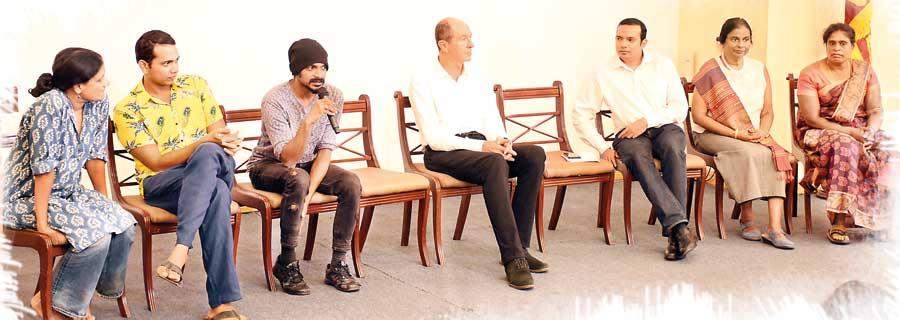
“I felt secure after I started receiving a basic income every month,” says Palitha Abeyratne, a theatre artiste and a musician who was a recipient of the Unconditional Basic Income (UBI) scheme.
“Before my marriage, I lived a carefree life but things changed after I became a father. I knew I had a bigger responsibility but that was linked to getting a salary. I need a stress free mind to put a melody to a song or perform a character on stage. But with this burden, I couldn’t concentrate on my career in arts. With UBI I can now keep my family and my parents happy, even in a small way and concentrate on my work.” This is one of many success stories heard as a result of the UBI concept introduced to Sri Lanka as a pilot project of the Basic Income Sri Lanka (BISL) programme.
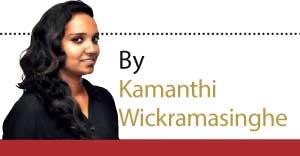
Basic Income also known as universal or unconditional basic income is a periodic payment delivered to beneficiaries on an individual basis without any work requirement. Under the aegis of the Poornam Foundation, BISL has been working since 2017 to raise awareness on UBI and its benefits to people. After much consideration, Selvi Sachithanandam, founder of BISL and Chief Executive Officer of the Poornam Foundation and her team has earmarked four vulnerable communities to be beneficiaries of this concept. These include war widows in the North and East, voluntary artistes from the South, women in a Muslim fisher person’s union in the East and tea estate workers in Central Province.
The stories of these groups were filled with trauma and the team realized that they weren’t heard properly, with compassion and understanding. Beneficiaries are selected by drawing lots and this is how three women started receiving basic income since last year.
Artistes were chosen by nomination since their needs were not uniform and this is how two artistes from the Stages Theatre Group benefitted from this programme also from last year. During the next year, they will select beneficiaries from the next two groups. Sponsors need to deposit a sum of Rs. 240,000 to the BISL account and thereafter BISL will transfer Rs. 10,000 to the recipient via standing order payments for two years. Overhead and administrative costs will be borne by Poornam Foundation.
At a recently held seminar, the ‘Efficacy of Basic Income’ was discussed under different avenues and the following are excerpts from the speeches.
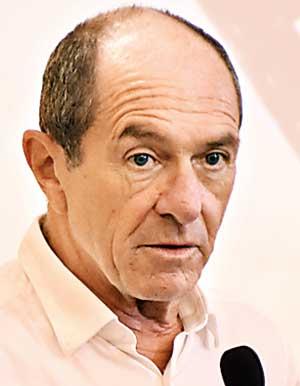 Basic Income strengthens humans: Schmidt
Basic Income strengthens humans: Schmidt
“When I started travelling worldwide the most important experience for me has been that there are human beings everywhere,” said Basic Income activist Enno Schmidt who has been promoting the concept of Unconditional Basic Income (UBI) since 2016 in many countries including India and now in Sri Lanka. “Primarily, UBI is about dignity, freedom, culture and bringing about a paradigm shift in the 21st century. Work and income could be thought apart. You need an income to live and you need work to benefit others. We all are doing things for our people – whether it is a mother taking care of a child, whether it is a taxi driver looking at people going from one place to another, whatever work you are doing is for other people. We are living in a social world. Work is your life and therefore you cannot split life and work. When talking about UBI it’s about looking at income and work apart, in fact on the level of basic needs. It’s not for the rich or poor or single mothers, it’s for everybody. Without basic income, you cannot live. Digitization is taking over a lot of the work done by humans back in the day. The challenge for human work is erroneous. We need to put more effort, think more, be more sensible and care more about others. Therefore a lot of new work should be done by humans which cannot be done by machines.”
According to Schmidt, UBI strengthens humans.
“Pilot projects are already being done in India, Namibia, the US, Finland and projects are in preparation in Scotland,” he added. “This is what governments are thinking about now. As a result of UBI, in Namibia for example, there’s less prostitution and more entrepreneurial activities done by women, more economically beneficial activities and a free market has been established. So with UBI you can say no to a bad job offer and say yes to things you like to do. With UBI there’ll be more social coherence and less violence. More than half the work done is unpaid and they are done by women. Most of the work done by women is more important in terms of social cohesion but they are never paid. Income is needed for life and work is what you do for others. UBI could be misused and therefore it’s important to understand what it is.”
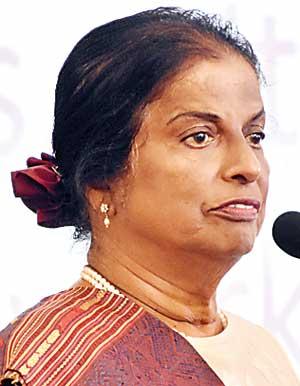 UBI is key to our survival and survival of our planet: Selvi
UBI is key to our survival and survival of our planet: Selvi
According to Selvi Sachithanantham, basic income is a periodical payment given for someone by virtue of that person being a human being. “We started this project with just three people and now it has grown into a large group. It’s not linked to anything he or she does in terms of work,” she said. “It’s given so that he or she lives a life of dignity, self-respect and love. That’s what basic income will do and it does even now. Basic income is making people more human. What happens when you are in a rat race? What happens when you are being treated as someone who is doing a job for the money you are being paid for? You become dehumanized. This is what is happening to us now. When you are in survival mode, it is only your amphibian brain within your cerebral cortex that is active.
"At this point, people are walking towards the precipice and they are aware of it. UBI is key to our survival and the survival of our planet. So I want all of you to vote for basic income"
The amphibian brain works in tandem with your identity and ego. But the pure intelligence - that part of you which is human, is silenced by the amphibian brain. This is the core of the existential crisis we are facing today. We are becoming more dehumanized by the system which has exasperated humanities where 1% wastes 70% of the world’s resources. So we are unable to find out what we could do about it. This crisis is globalized. We are also facing a crisis in terms of the planet. We see how water is poisoned, the air is polluted, how animals and even humans are being treated. Everything is in crisis. At this point, people are walking towards the precipice and they are aware of it. UBI is key to our survival and the survival of our planet. So I want all of you to vote for basic income.”
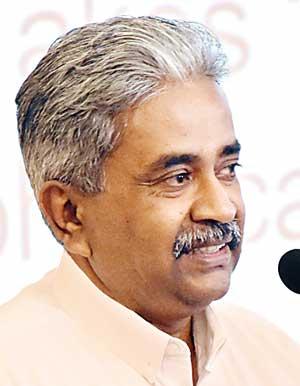 Brings a fresh wave of thinking: Dr Ariyaratne
Brings a fresh wave of thinking: Dr Ariyaratne
Relating UBI in terms of the Buddhist perspective, Dr Vinya Ariyaratne, President of the Sarvodaya Movement said that ‘basic’ means satisfying one’s needs at a certain level with some dignity. “If we take the Four Brahma Viharas – Metta, Karuna, Muditha and upekha these have been embedded in the practical dimension of our work where individuals have been connected by trying to put those spiritual values into action. At an individual level, the results may not always be possible. Then you need to withstand criticism and insult. So you need to build up a mind that understands equanimity. We then take it to the next level of true awakening which is what we call the Four Principles of Social Conduct or the Sathara Sangraha Wasthu. Sharing or dhaana is very important because as per the current economic system we depend on income through work which doesn’t always go to fulfil the inner beings. Therefore we need to share what we have. In addition to that our language has also become very viscous and divisive. So we have to work on pleasant speech or priya vachana. Then we have to focus on constructive action (arthacharya) within the community. Even the economic activities we are involved in should not be destructive of the environment or human relations. Then finally we focus on the concept of equality or samanathmathava. Economic activity is one part of a community awakening process and this has worked in a large number of communities and has resulted in uplifting impoverished communities as well. Through that, we have been able to address the ten basic human needs. We are not trying to create a rich few or we are not trying to create profits and this economic model is not engaged in immoral activities. We try to give priority on social objectives than on economic objectives.”
He further said that people need to put an end to wasteful lifestyles. “There are a lot of temptations in our society. I think there has to be a discipline to lead a simple life. It’s not just to have bare minimums, people need to have dignity without going to the extent of affluence. Then there are structural injustices. Our country is such a blessed country but why are we in the extremes of poverty? We have to address structural issues but there’s a fundamental crisis of governance in Sri Lanka. People also disregard spiritual activities because they think it’s not economical and this is a fundamental mistake. We also need to ensure that community savings circulate within the community. More than 70% of income is generated from poor people of this country but to whom are state banks giving loans? They run behind rich people. I was thinking whether schemes like Samurdhi could be adopted differently in line with basic income because there is a huge amount of government money. There’s a need for innovative thinking and the concept of basic income brings that wave of fresh thinking to do things in a different way.”
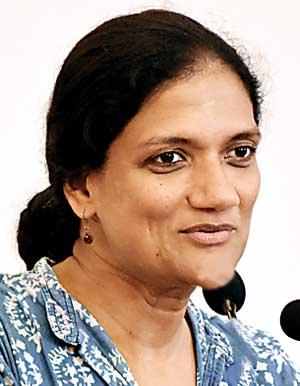 Recognizes value of investing in people: Ruwanthie
Recognizes value of investing in people: Ruwanthie
“I wish we lived in a country that was proud of its artistes and recognized artistes as crucial to society as doctors or lawyers,” said Ruwanthie De Chickera, playwright, screenwriter and artistic director of Stages Theatre Group.
“I’m speaking on behalf of artistes and artists have the potential to provide space for the society to think. I have worked in the arts for 20 years. 10 years after I started doing drama, everybody I have started with has moved on to do ‘proper’ jobs. But some of them would still contribute to drama whenever they can in their free time. I know that most of them would have rather stayed as artistes but they moved on to other jobs. Most of them are proper jobs which ensure a regular salary. Now I continue my work with a bunch of 20-year-olds. But it’s good to be working with young people. Doctors are needed in a country full of sick people and lawyers are needed in a country where people break the law. Similarly, artistes are needed in a country where people turn to art and want to be pushed to think about things differently; to imagine things they haven’t imagined before.
" I think it’s a project that recognises the value of investing in people and contributes to the imagination of a country"
“This is the kind of society we should aspire to live in. I’m very appreciative of basic income and I think Selvi has done a remarkable job by starting this initiative in this country. In her capacity, she has chosen two groups of people - women who are affected by war and artistes as two vulnerable communities. I think it’s a project that recognises the value of investing in people and contributes to the imagination of a country. This would eventually contribute to growth on those terms.”
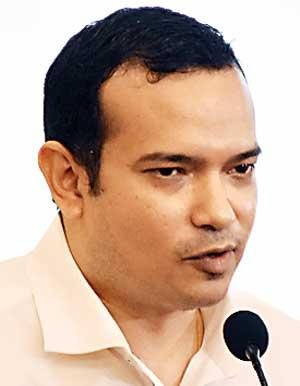 UBI will help people to re-skill themselves: Rohith
UBI will help people to re-skill themselves: Rohith
Adding a futuristic perspective, Rohith Pradeep, Chief Executive Officer at SAKS Global - a multifaceted outsourcing service provider offering Data Science, Finance and various solutions worldwide, emphasized the role of UBI in an automated economy. “Threats to humanity come in many forms; some are physical where there is disruption of the environment leading up to climate change. Artificial Intelligence (AI) sets a trigger in the existential crisis. This sentiment has been resonated by other technology leaders such as Elon Musk and Mark Zuckerberg.
Some of the emerging issues in the world include land-use reform, climate change, world health, nuclear security, biosecurity, promoting effective altruism and the risk of artificial intelligence lies at number one. Researchers feel that the threat of AI is high because not enough research is going into this area. Unemployment is taking place as a result of automation and artificial intelligence. According to the Future of Work Report by the World Economic Forum, over 75 million jobs would be eliminated by 2022. Close to 3100 AI startups are present globally, tackling various facets from health to finance and other sectors. Given our capitalist model where profit maximization is the main objective, jobs would be the first to go. Trends such as autonomous bribing would take place in the next 7-8 years.
But there’s also a positive camp which says that 133 million jobs would be created in the next five years. These jobs would require more human intervention, emotion and creativity. These including the need for data scientists, marketing and sales-based jobs that require human intelligence. AI will increase global GDP by 15 trillion USD by 2030. There’s a great amount of wealth that would be created but that would be biased towards certain countries that would adopt these technologies including China, US, UK and Europe. Within last year itself, around 2 trillion dollars have been attributed to what AI has brought in to certain economies. When talking about the role of UBI in an AI and automated economy, UBI can play a role in driving wages down, it can prevent people from getting to desperate situations and try to maintain their dignity. Since the economy is run on consumption, UBI will help sort that aspect out. It will also allow people to re-skill themselves. UBI allows one to understand their sense of purpose and belonging which is key to one’s well being.”
Pix by Kushan Pathiraja